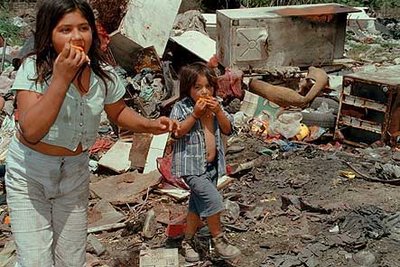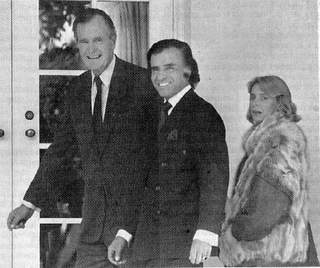
ABOUT THE UNSAFE CITY
by Amelia Lafferriere
Think back to the ear of Menem, our Arab Muslim-converted-Christian-(for the sake of politics) president (1989-1999), who introduced Argentina to the quick fix policies of neoliberall economic politics with its systemic unemployment policies and de-industrialization. strong introducer(the first after the militars),and Supposedly a close friend and huntig companions of the Bush family, Menem followed the military dictatorship. His policies converted the country into a desert in terms of productive industry and real jobs-- which continued under De la Rua-- and created a deep chasm between rich and poor, nearly annihilating the middle class (a middle class which had been the pride of Argnetina, the only country in Latin America that had managed to maintain a strong and healthy middle class over the decades).

Buenos Aires, where, as you so correctly mention, half of the population live if we put together the Capital and Gran Buenos Aires, started its process of economic and then social degradation. Menem presided over recession, hyperinflation, privitiziation of ultilities and a tidal wave of foreign "investment." Menem's endemic corruption and his quick fix policies got him re-elected but they were catastrophic for the long-term financial and social health of Argentina, leading to bankruptcy and severe dislocation in every sphere of human endeavor. Parallel worlds began to take root-- a world of the rich and a world of everyone else.
Shopping centers and gated communities for the wealthy were sprouting up, here and there-- like gentrified Puerto Madero, funded by international capital... while social welfare was left to rot and whither away on the vine.
People of the suburbs, with no work and no future started to invade the city, sometimes taking empty old abandoned houses and turning to street robbery to get by. The result: growing unsafety and insecurity for the society. (Current policies about this issues are not helping, but that s another song.)
There are a lot of tourists coming all the time and sometimes they are very visible for these desperate people, making them obvious targets, not to say that locals do not suffer this unsafety as well, probably far more, in fact.
Regarding major crime-- like kidnapping and car theft sometimes leading to murder-- it is often that we find bands of ex-policemen working in combination with lumpen proletariat from the exurban villas (barrios), doing all this, most frequently in the suburbs. I'll call this a residual of last military government (what is called mano de obra desocupada, this meaning that these people were employed in kidnaping and robbing people for political reasons and when democracy came back, they had no "legitimate" work... so they changed their targets. We have been in "democracy" since 1983 but this situation continues today.)
What I can conclude is that Buenos Aires at this time has more insecurity and less safety than it had ten years ago. There are neighborhoods that are more exposed , especially those visited by tourists, although all neighborhoods throughout Buenos Aires suffer the situation, Fortunately we can say that so far the kinds of robbery prevelent in Buenos Aires is NOT followed by murder... most of the time.
Anyway the climax of unsafety of Argentine society comes with the fact that we have a high profile political missing person for over 3 months. Mr Julio Lopez, a worker who had been kidnapped and tortured in the seventies, and who remained alive by chance, has given in the trial to one of his captors ,a miliray government sanctioned murderer named Etchecolaz. After his testimony-- on his way to hear the judge read Etchecolaz' sentence-- he vanished.
Etchecolaz is now in prison, where he belonged many years ago, but Mr Lopez, a 78 years old man, seems to have suffered a kidnapping for the second time, and we all presume he is dead.
The very idea that this could happen now, is really frightening-- and although it does not affect everyday life on the surface, the way it used to in the seventies, for me is the most serious security and safety problem we have at this moment...
Like in all big cities, but starting in Buenos Aires in the '90s, drugs have become a terrible problem, mostly cheap and low quality drugs that are readily available in the impoverished suburban neighborhoods. That and the lack of opportunities for people are the keys to a developing culture of crime here.
Still, I like to think that the pulse of this city has to be taken in view of the continuous work in the cultural arenas. People are massively working in the fields of music, cinema, theatre, education... putting on festivals. Universities are still free in Argentina and the fact that two graduates have recently won Nobel prizes are a great source of inspiration for many people. Buenos Aires is a place where you find friendly peopl everywhere, where you can spend several hours in a cafe-- and for the price of a cup of coffee, you can read the newspapers of the day, or a book, talk with people who see conversation as a living art, people with open minds who make it possible to have so many different cultural expressions welcome all the time in the city. Still today Buenos Aires is a city with a pacific coexistance of different religions, as Jew (Argentina is the second country in numer of Jewish population after Israel and the U.S.) and Arabs and Muslims. We have often ecumenical ceremonies of all the religions together with Catholic and different Christian churches, together with the Jewish and the Muslim faiths.
Could this be-- the remains of what Argentina was going to be and didn't come to be, but still a part of it.-- breathing... and helping us all breathe and hope.
UPDATE: A SLIGHTLY MORE POLITICAL LOOK AT THIS
I did a piece over at Down With Tyranny if you'd like to look at it from an even more political perspective.






0 comments: